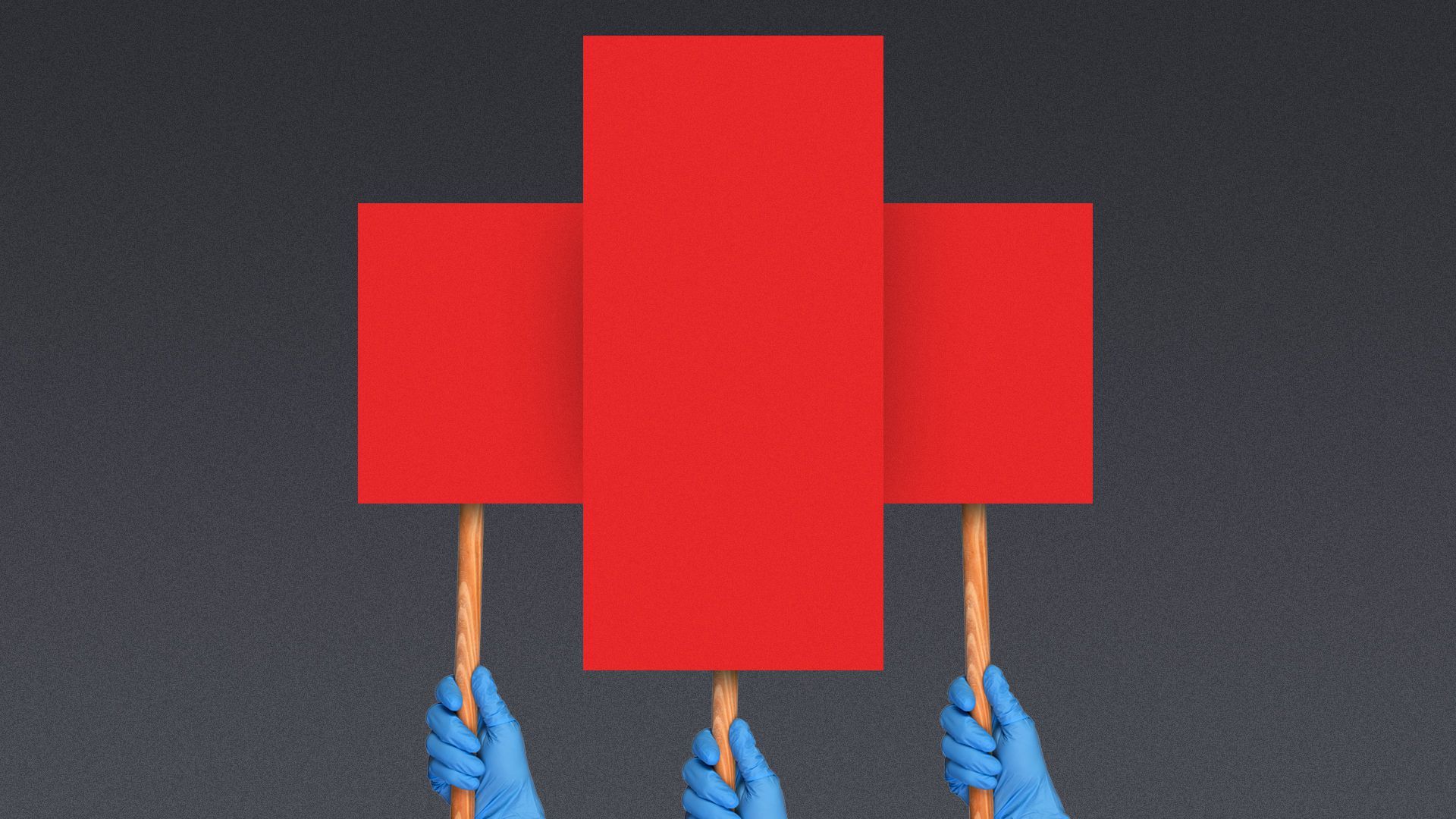| | | | | | | Presented By PhRMA | | | | Axios Vitals | | By Tina Reed ·Oct 12, 2021 | | Good morning, Vitals readers. Today's newsletter is 999 words, or a 4-minute read. | | | | | | 1 big thing: The health care worker revolt |  | | | Illustration: Shoshana Gordon/Axios | | | | The toll of the coronavirus pandemic has spurred nurses, front-line technicians and other hospital employees to walk out or authorize strikes, Axios' Bob Herman reports. Why it matters: The pandemic has buckled a system that already faced worker shortages and burnout. Patients ultimately can't receive adequate care if workers leave from the stress and violence. Driving the news: Unions representing more than 24,000 nurses and other hospital workers yesterday authorized strikes at Kaiser Permanente facilities in California and Oregon. - A strike authorization does not automatically trigger a strike. Unions still have to provide hospitals with a 10-day notice before walking out.
- Kaiser Permanente proposed 1% annual pay raises over the next three years and a two-tier wage system, but unions want 4% annual pay raises and no two-tier system.
Zoom out: The Kaiser Permanente fight is just the latest of several labor disputes. - More than 700 nurses at Saint Vincent Hospital, a Tenet Healthcare facility in Massachusetts, have been on strike for seven months.
- Roughly 2,000 people who work at Mercy Hospital in New York, part of Catholic Health System, have been on strike since the start of October.
- Home care workers in Connecticut rallied for higher pay last month.
- Other recent health care strikes have taken place in Alabama, Montana and Oregon, among other places.
What they're saying: "We're drowning. There's just not enough staff," Jennifer Stone, a unionized ER technician at Sutter Delta Medical Center in California, said in a press release earlier this month. "We're talking down angry COVID patients, then we're rushing to a code ... We can't do it all anymore." The big picture: The health care industry has lost more than 540,000 jobs between February 2020 and September 2021. - Hospitals are down 117,000 people, and nursing homes are down 247,000.
|     | | | | | | 2. Axios-Ipsos poll: Biden is losing COVID trust |  Data: Axios/Ipsos Poll; Chart: Kavya Beheraj/Axios Americans' trust in President Biden has eroded as they've slowed their expectations for how quickly they can get back to their pre-pandemic lives, Axios' Margaret Talev writes from the latest installment of the Axios/Ipsos Coronavirus Index. Why it matters: Two trends we've been watching for a while — drawn-out timelines for returning to normal, and declining trust — are not a coincidence but cause-and-effect, these findings suggest. That's hurting Biden with Democrats as well as independents. What they're saying: "He's basically losing the expectations game," said Cliff Young, president of Ipsos U.S. public affairs. "Once the Delta variant raised its ugly head, it affected people's lives, and now they're adjusting their expectations, which is not good for him." The big question: How much and how fast will Biden's trust numbers recover if infection and hospitalization rates continue to get better? By the numbers: In our June survey, 36% of U.S. adults said they expected to be able to get back to their normal, pre-COVID lives at some point within six months. - Today, that share is just 13%.
Share this story. |     | | | | | | 3. Old drug gets another look in Alzheimer's fight | | Researchers are taking another look at an old generic hypertension drug for its potential to prevent Alzheimer's disease, STAT reports. Why it matters: The study, published in Nature Aging, offers a potential clue in the effort to curb the most common neurodegenerative disease in the U.S. and highlights just how much researchers still have to learn about what causes it, per STAT. The details: The drug bumetanide was found to reverse signs of Alzheimer's in mice, as well as human brain cells in lab dishes. - Further, researchers looked at EHR data for millions of patients older than 65 and found significantly lower Alzheimer's prevalence.
State of play: Of the 260 medicines in development against neurodegenerative diseases, there are 85 medicines in the pipeline for Alzheimer's disease, according to a report released by PhRMA this morning. - The disease is estimated to impact 6 million Americans annually and cost the U.S. economy $355 billion in 2021, they said.
What to watch: Roche announced Friday its gantenerumab antibody drug received breakthrough therapy designation from the FDA for the treatment of Alzheimer's disease. |     | | | | | | A message from PhRMA | | Bringing the VA system to Medicare could hurt patients' access | | |  | | | | Congress is considering a plan that would tie medicine prices in Medicare to those in the U.S. Department of Veterans Affairs. This misguided approach is the latest in a series of government price-setting proposals that threaten patients' access to medicines and future innovation. Learn more. | | | | | | 4. Poll tests top Medicare negotiation arguments |  Data: KFF; Chart: Will Chase/Axios Americans are more convinced by the arguments made in favor of allowing the government to negotiate prescription drug prices than they are by those made against the policy, Axios' Caitlin Owens writes from new KFF polling. Between the lines: Just because the measure is popular with the public doesn't mean it'll pass, and it's in serious hot water with moderate Democrats. What they found: The poll asked respondents whether they found two different arguments convincing: one that claimed Medicare negotiations would lead to fewer drugs and the other saying negotiation would help bring down drug prices. - A third of respondents said they found the argument against negotiation "very or somewhat" convincing compared to 84% of respondents who said they found the argument for negotiation "very or somewhat" convincing.
Read more. |     | | | | | | 5. Kids' mental health response to pandemic |  | | | Illustration: Sarah Grillo/Axios | | | | In the weeks after the start of the COVID-19 pandemic, at least 55% of children felt more "sad, depressed, or unhappy," compared to 25% of adults, according to a new report out Monday from the Child Mind Institute, Axios' Marisa Fernandez reports. Why it matters: The data offers a glimpse at the differences in children's early psych0logical responses as researchers work to tease out the pandemic's potential long-term effects on the incoming generation's mental health and developmental skills. - Generally, people who lived where outbreaks were more severe, lived in urban areas or were related to health care workers surveyed much higher levels of anxiety and depression.
- Children in financially unstable households or experiencing food instability during the time of the study experienced worse mental health outcomes than those in more financially secure environments.
|     | | | | | | 6. Business notes | - Merck said Monday it submitted an FDA application for an emergency use authorization for molnupiravir, its experimental antiviral COVID-19 treatment. (Axios)
- Advocates are fighting against the $14.5 billion health records industry, shaping what health-record software looks like — and who wins IT contracts. (Insider)
- PointClickCare, a healthcare software company, announced this morning a contract to provide the CDC with comprehensive, de-identified patient data for residents of long-term and post-acute care facilities to better understand the long-term impact of threats like COVID.
|     | | | | | | A message from PhRMA | | Bringing the VA system to Medicare could hurt patients' access | | |  | | | | Congress is considering a plan that would tie medicine prices in Medicare to those in the U.S. Department of Veterans Affairs. This misguided approach is the latest in a series of government price-setting proposals that threaten patients' access to medicines and future innovation. Learn more. | | | | 📫 Love this newsletter? Tell your friends, co-workers and family members to subscribe! |  | | It'll help you deliver employee communications more effectively. | | | | | | Axios thanks our partners for supporting our newsletters. If you're interested in advertising, learn more here.
Sponsorship has no influence on editorial content. Axios, 3100 Clarendon Blvd, Suite 1300, Arlington VA 22201 | | | You received this email because you signed up for newsletters from Axios.
Change your preferences or unsubscribe here. | | | Was this email forwarded to you?
Sign up now to get Axios in your inbox. | | | | Follow Axios on social media:    | | | | | |









No comments:
Post a Comment